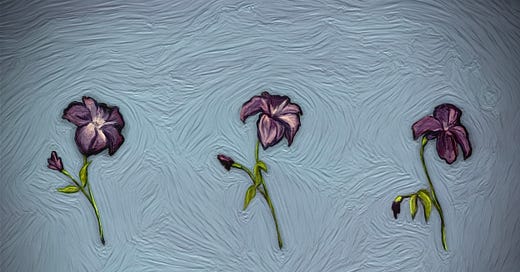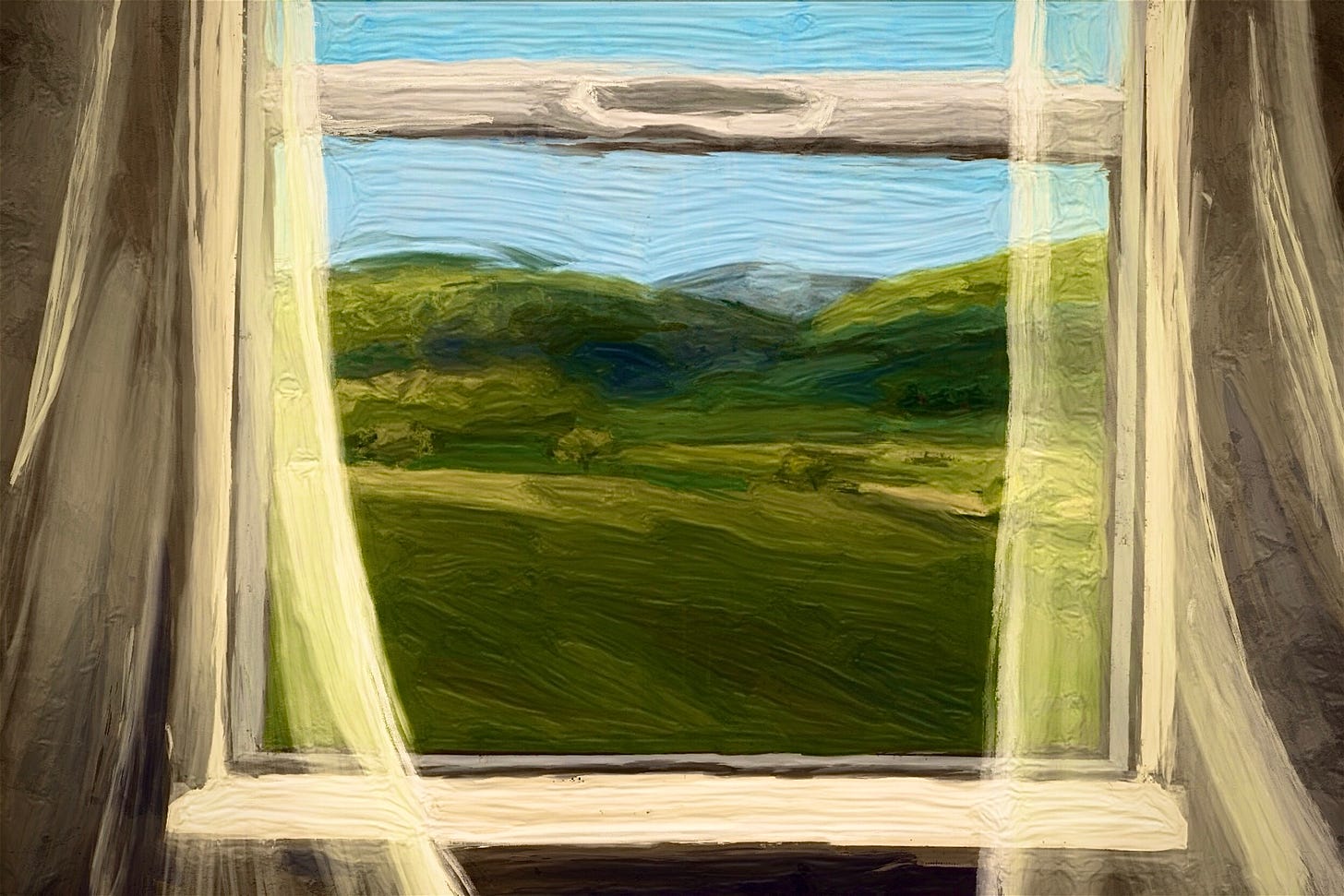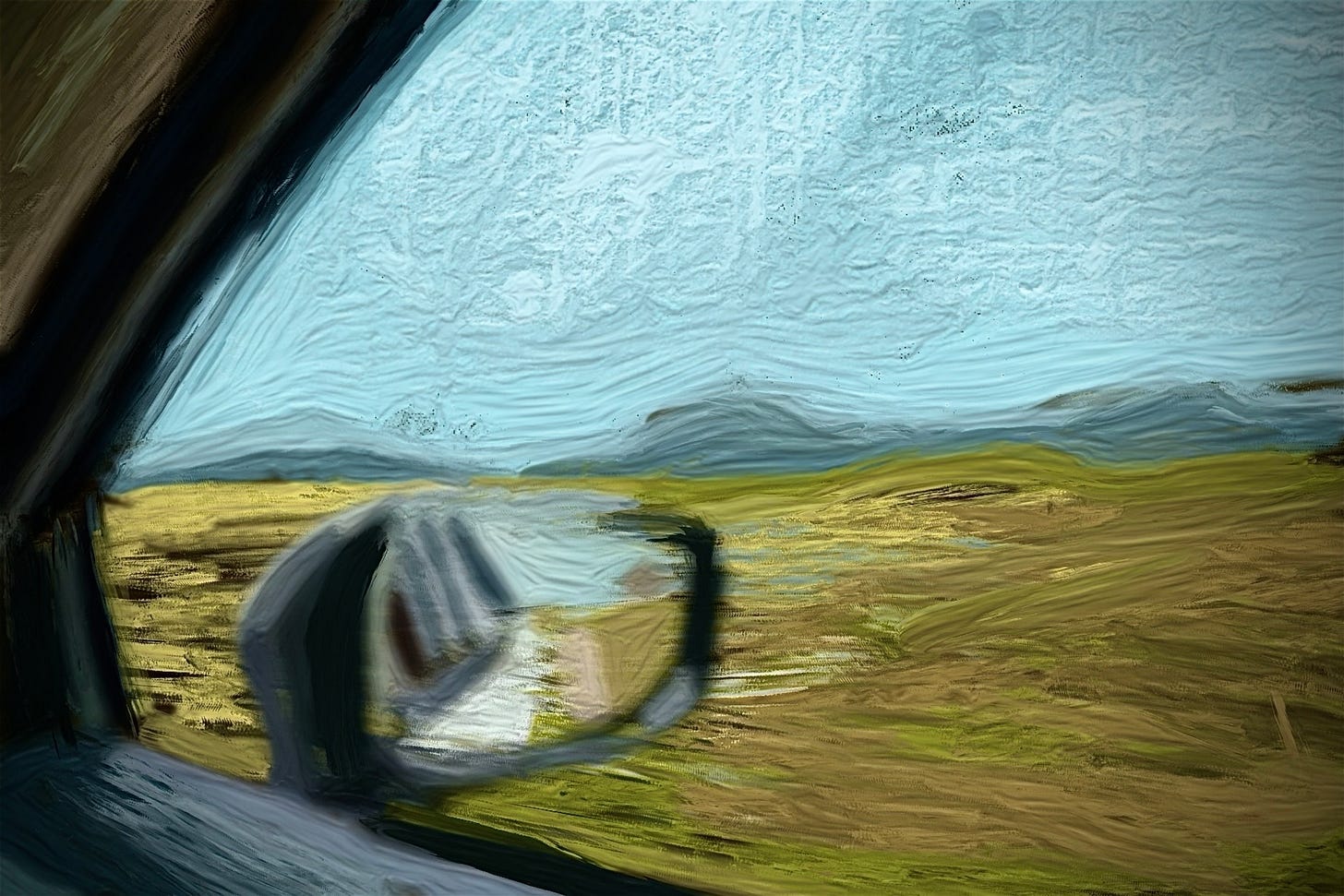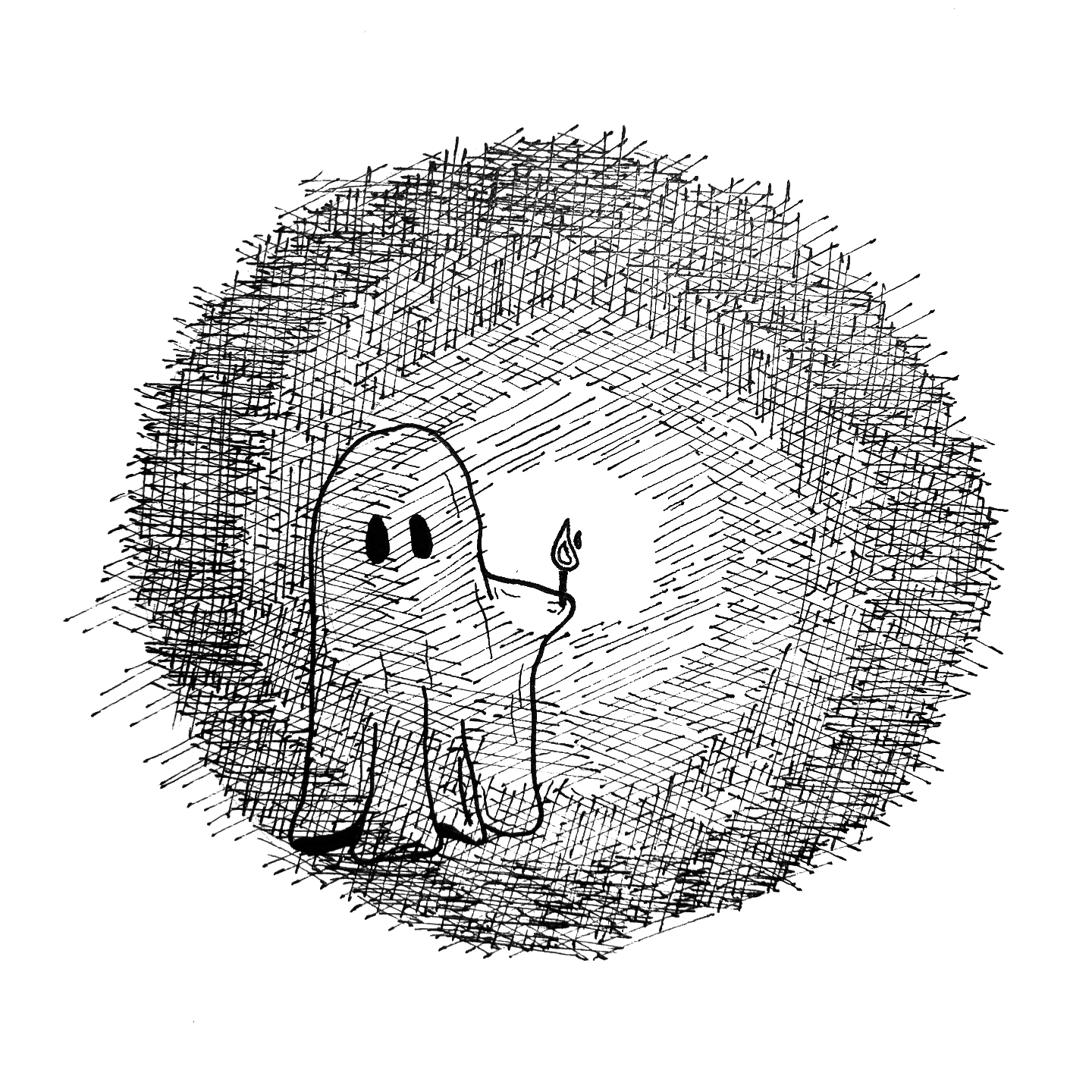The Quickest Path Between Two Points by Cass Francis
"Her husband used to say that a painter is an illusionist or a magician. Isabelle no longer agreed. A painter is a mother who nurtures the illusion until it can stand on its own."
I got so excited that TWO stories were noted as “distinguished” in the Best American Mystery and Suspense anthology out today (and also am so buried in grading and class stuff), I almost forgot to post this story!!


Francis writes about Isabelle’s life — and through her, art and getting older and love and life — so carefully and beautifully, no matter how many times I’ve read it, upon each revisit I find myself a little surprised anew just how much the story has swept me up inside itself. It is quiet, and so tender and hypnotic, it had me not only thinking about but looking at the world a little new, and what better feeling for a story — for art! — to inspire.
I hope you all enjoy spending a little time with it as much as I have.
—Aaron Burch
Isabelle had spent a lifetime training herself to see the light. Her husband had been trained as an artist and had made his money doing flashy and intricate illustrations for advertisements. Although she had no formal training of her own, he had explained this to her—painters are always chasing the light. He had stroked her fingers, pushed her hands up until they were backdropped by the wide emptiness of the bedroom ceiling. He had told her she had a painter’s fingers. He had kissed her knuckles softly.
From that moment on, she chased the light. Well, chased may be too dramatic a word. Rather, she noticed it. She let it guide her. The city where they were from and lived for the first few years of their married life was a grimy but textured teal. She bought her first set of paints at a dirty, cramped art store she must have walked by a thousand times as a girl, dreaming nothing but her dutiful dreams of home and husband.
She painted flowers and fruit. One quiet brushstroke at a time until her head swam and she would smell the oil paint in her dreams. Blues, purples, whites, pressed onto the canvas. Each color its own kind of light.
*
The first to come to her door with the offer was a gritty blue-collar man with gruff wide shoulders and a soft voice. Isabelle sat at her kitchen table painting when the knock came at the door. Although she had had the house to herself for almost a year now and unused rooms for longer than that she still preferred to work at the kitchen table, the same as she had when she first started, the same as she had while raising her son. The curtains were open and one window let in the rhythm of the gentle summer breeze. Outside, the pastures seemed to stretch on to the far edges of the world.
The knocking at the front door came again. Not incessant or impatient but firm, as if resolute with the knowledge that the sound had to be made, her attention had to be captured. Still, old women are not easily hurried. Isabelle slowly wiped off her brush and placed it on the table beside her easel. She stood, the chair creaking as her slim weight left it. She wove through the mazes of dusty furniture, knickknacks, piles of yellowing newspapers toward her front door.
She opened it only a crack, with the screen still latched.
“Hello,” said the man standing there when she didn’t say anything.
Once, when they had lived in the city, she had hosted lively dinner parties. Her husband had joked that she must be some rich socialite reincarnated, as she lived to dress up the house and organize a selection of finger foods and order bottles of the finest champagne an illustrator and housewife could buy. She wore shimmering evening gowns and invited only the most interesting people she could find. For months, she would scout the neighborhood for the guest list.
“Sorry to bother you, ma’am,” said the man now at her front door. “But I was wondering if I could have a moment of your time. I’m with the Southwest Highway Association. I don’t know if you’ve received our messages.” He wore khakis and a very stiff blue dress shirt. His hair brushed back a bit in the wind. Under the eave of the porch he was a silhouette with the light of the pastures beyond.
“My phone doesn’t work,” said Isabelle. She had used scissors to clip it from the wall.
“We sent letters as well.”
“Junk mail goes straight to the burning pile.”
He smiled. Isabelle realized she must remind him of his mother, and she felt a warmth toward the man even as she steeled herself to be surlier than ever.
“It doesn’t matter,” he said. “I’m here now. We can just talk about it. See, the Southwest Highway Association has a very generous offer for you.” His brown eyes gleamed with secondhand generosity.
Isabelle had learned in fifty-two years of marriage that sometimes the kindest thing you could do for a man was hear him out, even if your mind was already made up. Besides, even though she had grown accustomed to her own company in the last year she missed having a masculine wall of energy in the house, radiating its own kind of light. She left him sitting on one of the rocking chairs on the porch and went back to the kitchen to make lemonade, the packets of flavoring she used when she didn’t have fresh lemons a bit clumpy inside from humidity and age. Her painting, of a field of Texas bluebonnets, left drying in the breeze. As her paintings always had, it would wait for her to return to it.
She sipped lemonade from her glass as he talked, rocking in his chair nervously on her porch. “What is the quickest path between two points?” he asked. “A straight line.” He held up his hands as if the whole world could be summed up in a statement as simple as that.
Isabelle imagined a straight line threading through the emptiness between his hands.
“I promise I’ll think about it,” she told the man, although the offer would linger in her mind only as long as the dirty lemonade glasses in the sink.
Her son came knocking next. He interrupted her shading the vulnerable white of lily petals with his sharp knocks and then, “Mom, it’s me.” His whole life, she had done the same as she did now—a soft sigh, slowly placing the paintbrush on the table, rising and going to him. He did not linger patiently like the highway man had but instead barged in. After all, this had been his house as well for fifteen years. He wore a down vest over a t-shirt, even his jeans spotless, wrinkle-less, and expensive. His wife was a lawyer, and he was an engineer. Like his father, he drew sharp, precise lines from which he made enough money to live by.
Isabelle didn’t make him lemonade.
“Did you get the new dryer I sent you?” he asked, leaning back on the couch and crossing his leg over his knee. Her old one had stopped working, the clothes coming out damp and musty. For a time, she had enjoyed taking them outside, watching them flap in the wind and smell of sunlight when she brought them back inside.
“Yes.”
“Good. I didn’t trust those delivery guys, but—” he shrugged. His sense of inevitable logic reminded Isabelle of the blue-collar highway man shrugging that the quickest path between two points cut right through her home.
“I know why you’re here.” She eased down into her reclining chair, brown and well-worn and sitting beside the empty one that used to house her husband.
Her son sighed. “Then you’ve at least thought about it.”
Growing up, he played soccer. Team photos and tournament trophies decorated the mantle, beside family vacation photos to Niagara Falls, New York City. Isabelle no longer noticed them, they had been there so long.
“I can’t leave yet,” she said. “The light...”
Painting in the city had given her work a grimy blue tint. At first, she had not noticed it. She painted the potted plants she kept along the windowsill of their apartment. A fern overflowing into the floor under her care, petunias with their spotted purple gleaming in the evening sunshine, orange spilling through the curtains and onto the linoleum. She painted the fruit she brought home from the supermarket, the bananas she would mash for her son, the apples she would turn into applesauce, the lemons she would turn into lemonade. Often, she would only get in a brushstroke or two before being interrupted—an awakened baby or time to start dinner. Still, she loved it, then. The quiet steadiness of her life.
Then one day her husband surprised her. “Let’s take a trip to the country. Just you and me.”
“You can paint anywhere, Mom,” said her son.
Her son had proposed to his wife at the Grand Canyon. Isabelle had been apathetic about their marriage but something about the proposal had bothered her. Him small on one knee, his wife-to-be small above, the ring smaller between them, and beyond them the gaping expanse of the canyon, framed as if it were only meant to be the backdrop of their happiest moment.
“The light here is very unique,” she said.
Isabelle and her son were two people bound together by fate, but not at all like each other. If they were not son and mother, they would be strangers. Polite nods when passing one another on the street, well-mannered gratitude when holding the door for one another. But now they sat across from each other in the family living room.
“The highway company would pay good money for this place.”
“Yes, a generous offer, so I’ve heard.”
“It’s not safe for you to be out here alone anyway.”
“Your father and I lived out here alone for almost twenty years.”
“Well, Dad is gone now.”
Isabelle supposed that she loved her son. Love is such a selfish thing. She loved him in the same selfish way he must love his wife—the way that led him to propose at the Grand Canyon, turning one of the world’s seven wonders into a testament to his feelings. “The light here is very particular. It is very white and very pure. I need it for my paintings.”
“Mom, they make artist lights now. They’re just as good. I’ll buy you one.”
In the city in the grimy teal light, during one of her dark moods, she had looked at her son sleeping in his crib and had the quickest and most fleeting thought of running away. In that moment, life seemed so long and so pointless and she seemed so broken and stuck. He would grow up to suffer and love, as every human had suffered and loved before him. As Isabelle herself had suffered and loved, quietly cleaning and cooking dinner while her husband went to work. Of course, when she looked deeper at her child, such thoughts evaporated. His face was soft in slumber and his tiny fingers closed in tiny fists. Pink and white with sharp blues and purples shaping uniquely him, her child.
Isabelle and her son were two people bound together by fate, but not at all like each other. If they were not son and mother, they would be strangers.
When her mind wandered while painting, sometimes she imagined it—the highway snaking toward her, through the pastures. She imagined the roughness of the asphalt under her fingers, the rumbling sound of tires against the stone, the way the heat would dance above the blackness. She imagined the cities that would rise behind it. The shadows that would fall in its wake. The new places that people, families, would explore because of it. The pastures cut in two, divided into the coming and the going.
She painted a single petunia. She painted it over and over again at different times of the day, with curtains closed and open, with morning light and evening dusk, as chicken roasted in the oven and cookies cooled on the counter. She painted it until the flower itself withered and fell from its stem, and then she painted it from memory. She wanted to preserve and know every subtle shade.
As she always had, she kept her paintings in the attic. One day she would die and her son would be forced to sort through canvases upon canvases of flowers and fruit. Even if he kept one or two, Isabelle knew he would need to trash most of them. She was no Picasso, no inspired artist—only a hobbyist, her paintings meant to pass the time and for dusty attics, not the priceless halls of museums and rich people’s walls. She had known this from the moment she started painting—that her life’s work was meant to be thrown away.
The last to visit her about the offer was the ghost of her husband. He was there leaning back in his recliner in the living room one morning, arms by his sides like a mummy, just as he always dozed there. He was not an old man wasted as he had been by the end. Instead, he looked again like he had when they had first moved to the country. Soft brown hair wispy over his bemused brows. Absentminded scruff on his jaws. He wore a cheap flannel and frayed jeans. She was relieved she still remembered him as this, not as the hollow, dying creature she’d cared for during the last months of his life.
She ignored him and went into the kitchen. Her most recent painting sat on the easel on the table. A sunflower, yellows and browns and the tiniest hint of oranges. She sat down and began to piddle with the paints.
He came in and leaned in the doorway.
At some point during the last decade or so of their marriage, Isabelle had noticed that her husband had grown bored with humanity. He had dozed in his reclining chair as game show reruns echoed their glow and tinny soundtracks through the empty house. The pastures had just seemed to remind him of how small they were and how pointless it all was, the way Isabelle had felt in the city. But she had managed to rise above his malaise. She picked wildflowers each morning, painted them before they wilted, and grew to recognize that every single one was different, and tried to show him how.
Now, the paint was thick on her brush. Often, she had to get started painting by taking a deep breath, gathering her courage to make the first stroke. She dove in with the brush, its bristles flaying as she made careful strips of color, a deep sunset pink. Each stroke was careful and practiced but free, with little but her own instinct to guide her. While she was learning to paint, all those years ago, her husband had guided her hand into the clean and professional strokes of an advertisement illustrator. She still felt his phantom fingers every time she painted even though she no longer needed his quiet guidance. She did not care if her paintings were professional. They were not. She did not care if her lines were clean. They were not. She used a brush caked with years of paint, the bristles too bent and stiff to make sharp lines.
With the pink, she made illogical highlights on the sunflower. Most people would not see pink in the yellows of a sunflower’s petals, but a painter was trained to see what was only quietly there. To paint the brightest yellow, you needed an undertone of pink, just like how you didn’t know what contentment was without tragedy, or what happiness was without loss.
She went on ignoring the ghost of her husband until he was gone and when she glanced at the doorframe leading from the kitchen he no longer leaned there. A dimly yellow light filtered in from the window and the pastures outside, echoing a strange brown-orange on the doorframe in flat rectangles made by the warped shadows of the blinds. Color is only light, after all, and a trick of the eye to give the light different flavors. Her husband used to say that a painter is an illusionist or a magician. Isabelle no longer agreed. A painter is a mother who nurtures the illusion until it can stand on its own.
If the highway didn’t go through here it would go through somewhere else. But the highway would go through here. Money, technology, and progress are inevitable—as inevitable as death and taxes. As connected as sons and mothers. As selfish as love.
To paint the brightest yellow, you needed an undertone of pink, just like how you didn’t know what contentment was without tragedy, or what happiness was without loss.
The man in a down vest sat on his knees beside a rented dumpster, surrounded by piles of knickknacks, quilts, and canvases. Because the highway was yet to be built, it had taken him nearly three hours to get here from the city, weaving through old and crumbling roads and passing mailboxes and barns without a gas station in sight. His wife was pregnant and since learning this he had gotten a strange rush of panic at things he had not even noticed before, such as the distance between him to gas stations and hospitals and the ease of breaking down on a country road with miles between them and help. Everything out here seemed distant and slow and dangerous. Coyotes in the shadows, copperheads in the grass, hawks in the sky.
His wife sat in a metal folding chair beside a pile of the canvases. “We should keep a couple of these,” she said, pawing through them.
“Oil paint is not good for a child to be around.”
She laughed. “The paint on these have been dried since before you were born, my dear.”
She kept sorting through them, tilting her head and imagining which would look best on her walls. “It would be like your mother there to witness everything,” she said softly, “to see her grandchild growing up.”
The man was quiet, sorting through the knickknacks to find which could be cleaned up and sold.
Around them, the pastures rippled. There was a still breeze and a quietness from the earth. In the distance a crumbling barn stood long abandoned, the wood frame dark against the sky. The man tried to think of the light as his mother had. Sharp bits of it glinted off the faces of the knickknacks and on any sharp edges of the furniture they had removed from the house. But one look through the canvases showcased that she had barely ever focused on the sharp glinting of the light and instead had been obsessed with the soft caresses of it. The man looked around at the belonging scattered across the yard and driveway. He saw only lines—the sharp boundary between the concrete and dirt, the scattered fans of the grass, the uneven arcs of the aging house.
With the money from the highway people, he had opened a saving account for his unborn child. Although his mother had been reluctant to leave this place, she would have sold, he believed, if she had lived long enough. He remembered her fondly from his childhood patiently talking him through his homework, gently chiding him to clean his room. Her legacy had been responsibility and duty and a sense of what love is, a resolute sense of presence. Her grandchild would be supported through her love of this place.
When the highway came, it would frame the land differently than before. The colors would blur together like an impressionist painting in their car windows. The land would unfurl and impress with its vastness, the horizons lines that no one would reach. Instead of just one family and one woman recognizing the beauty of this place, hundreds of thousands would as they race past on their road trips and ways to work. And certainly that was not a bad thing.
STORY:
Cass Francis is a born and raised Texan. She has lived everywhere from the plains of Lubbock to the piney woods of Nacogdoches, and currently resides in the "funkytown" of Fort Worth. Her work has appeared in Hoxie Gorge Review, Museum of Americana, and elsewhere. Find her fairly inactive but alive on Twitter/X @WriterCFrancis.
*
ART:
Everin Casey is a multimedia freelance artist and theatrical scenic painter from the Florida/Georgia line currently working in New York City. Their work can be found in various households, galleries, and theaters from coast to coast or on Instagram at @everrinart._
Next Tuesday, we’ll feature a bonus interview with Cass about this story!







This story blew me away. I just finished it and am sitting here quietly thrumming. I will read it again. It felt so real to me, as if the author had listened in on the conversations I have with myself and with my sister, a painter and noticer of color and light, as we both confront the next third of our lives.
Fine story💗🌷🌷